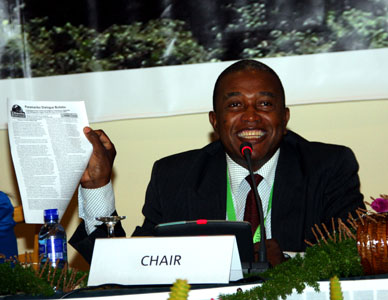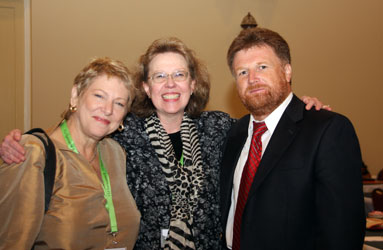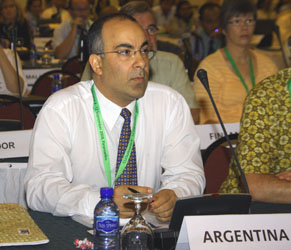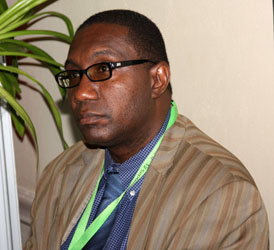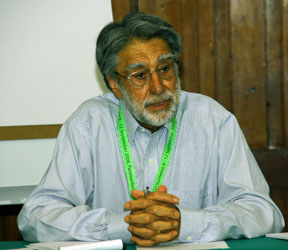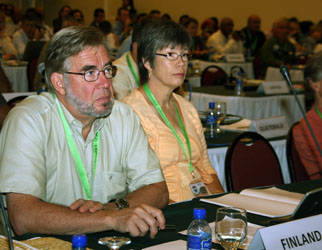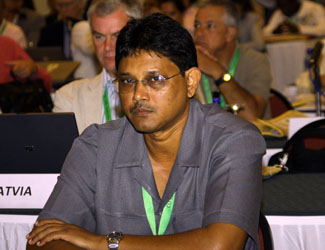|
|
|
MORNING PLENARY:
|
|
|
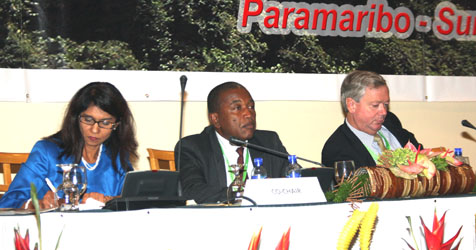 |
|
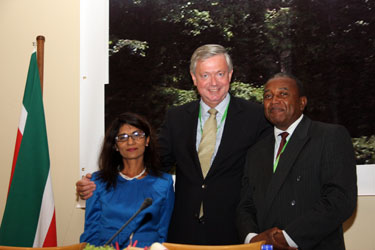 |
|
|
Above
photo L-R: The dais during plenary with Niermala
Hindori-Badrising (CLI Suriname Secretariat), Co-Chair Cornelis Pigot
(Suriname) and Co-Chair Hans
Hoogeveen (the Netherlands). |
|
|
|
|
REPORT FROM THE CO-CHAIRS OF THE
BREAKOUT GROUPS:
|
|
|
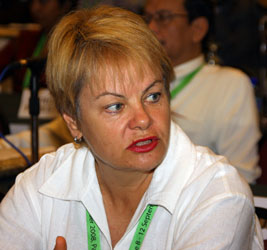 |
|
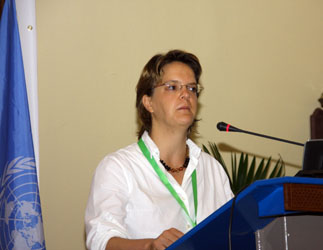 |
|
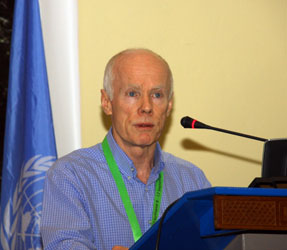 |
| Elise Haber,
South Africa |
|
Stefanie von
Scheliha, Germany |
|
John Hudson,
United Kingdom |
|
| The
co-chairs of the previous day's breakout groups, Elise
Haber, South Africa, Stefanie von Scheliha, Germany, and
John Hudson, United Kingdom, reported to plenary on their
respective groups' deliberations. They highlighted, inter alia, discussions on payments for reducing emissions from
deforestation and forest degradation (REDD), noting that
participants considered it an important potential financing
mechanism, but not the only one, as it excludes some countries
and focuses on one of many services provided by SFM. |
|
|
|
FINANCING FROM FOREST ECOSYSTEM SERVICES:
|
|
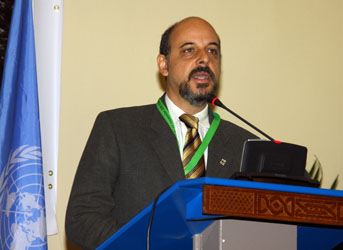 |
|
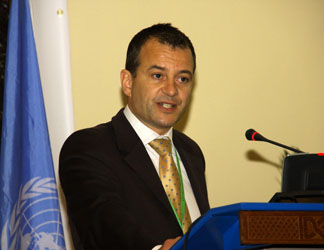 |
|
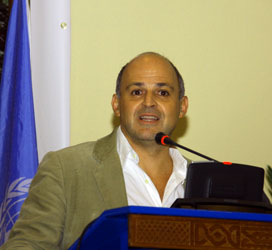 |
| Claudio
Maretti, WWF-Brazil, presented on Brazilian perspectives
of carbon compensation for the protection of the Amazon
rainforest. |
|
Simon
Petley, Enviromarket, UK, provided an overview of capital
markets available for forest financing. He noted that at
US$455 billion per annum, this represents ten times the amount
of overseas development assistance (ODA) currently assigned to
forests. |
|
Carlos
Manuel Rodriguez, Conservation International, presented on
creating an enabling policy environment to mobilize financing
from forest ecosystem services. |
|
|
|
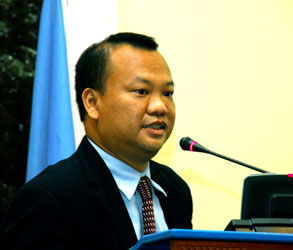
|
|
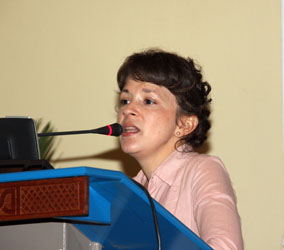
|
|
Rezal
Kusumaatmadja, Starling Resources,
presented on executing an ecosystem restoration concession in
the peat forests of Indonesian Borneo. Stressing their importance
as a carbon sink, he lamented that due to land use change
these forests are being lost and consequently
carbon emissions are increasing. |
|
Doris
Cordero, IUCN, discussed lessons learned regarding payment for environmental services in the Northern Andes, emphasizing the importance of considering differences in social, legal,
and institutional contexts. She lamented that there is an overall lack of understanding regarding the impacts of land
use change on local quantity and quality of water. |
|
|
|
|
|
|
BREAKOUT
GROUPS:
|
|
| Each
of the three breakout groups addressed the following
issues: policy, institutional and legal frameworks
needed for effective realization of PES; mechanisms to
utilize PES effectively towards SFM and societal
well-being; sensitivity and responsiveness of current
financial institutions and capital markets to support
SFM; cross-border protected areas; and availability of
information. |
|
|
|
BREAKOUT
GROUP 1:
|
|
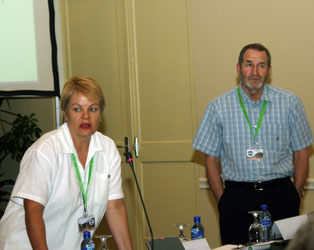 |
|
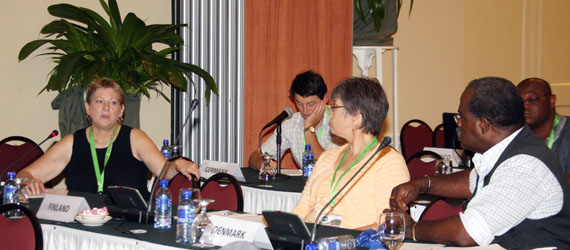 |
|
|
| Participants
asked for more information on practical demonstrations
of PES, while others questioned the replicability of
currently successful PES mechanisms in varying
contexts. They
agreed that a "one size fits all" model is not
realistic, noting that a portfolio approach
recognizes the different needs and capacity of
countries. |
|
|
| Above
photos L-R: Breakout co-chairs, Elise Haber (South
Africa) and Glen Kile (Australia); participants from
the breakout group in a lively discussion. |
|
|
|
|
|
BREAKOUT
GROUP 2:
|
|
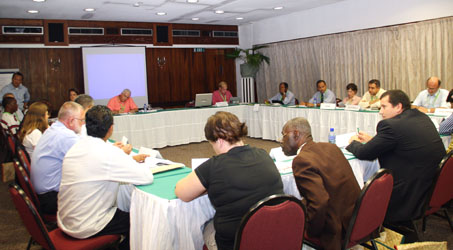 |
|
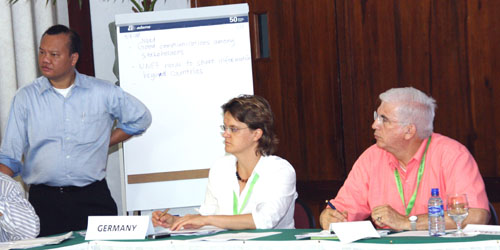 |
| Focusing
on how to create enabling environments for PES
mechanisms, delegates discussed the need to clarify
land tenure and create good business environments in
order to encourage the establishment and financing for
PES, with particular reference to specific and focused
legal frameworks. They also noted the need to
acknowledge the uniqueness of each country and
situation. Participants stressed that PES should not
focus solely on carbon payments but on other ecosystem
services to allow mechanisms to be more
inclusive. |
| Above
photos L-R: Participants discussing issues on PES;
Breakout Group Facilitator, Rezal Kusumaatmadja with
Co-Chairs Stefanie von Scheliha (Germany) and Carlos
Gonzalez (Mexico) |
|
|
|
BREAKOUT
GROUP 3:
|
|
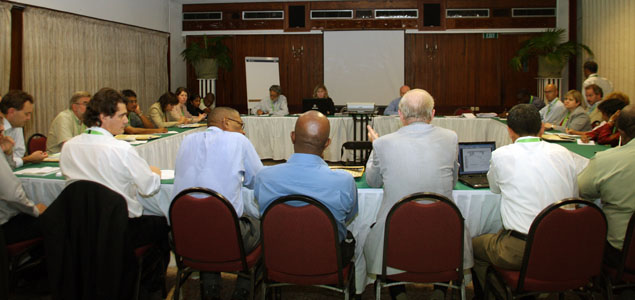 |
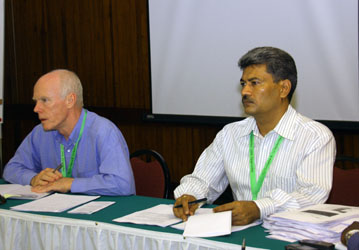
|
| Discussions
in this group focused on the level at which payment
for environmental services are bought and sold. Some
participants supported the notion that local
communities should determine which services are sold,
for how much, and to whom. |
|
|
Above photos L-R: Participants
exchanging ideas on PES; Co-Chairs John Hudson (United
Kingdom) and S.P. Yadev (India)
|
|
|
AFTERNOON
PLENARY:
|
|
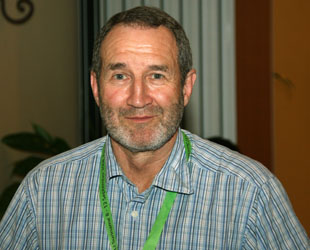 |
|
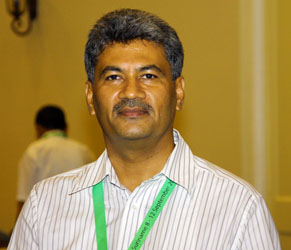 |
|
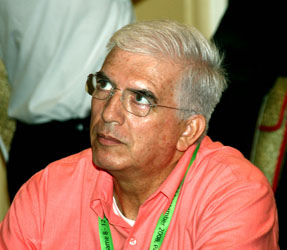 |
| Glen
Kile (Australia) |
|
S.P.
Yadav (India) |
|
Carlos
Gonzalez (Mexico) |
|
|
|
|
|
| Following
reports from the breakout group co-chairs, Glen Kile
(Australia), Carlos Gonzalez Vicente (Mexico),
S.P. Yadav (India), CLI Co-Chair Cornelis Pigot (Suriname)
concluded the sessions with some reflections on the first
two days' events, including that the discussions
within the breakout groups are increasing
participants' awareness of forest finance
challenges, and that this will contribute to a
successful outcome at UNFF 8.
|
|
|
|
FACES AT THE PARAMARIBO
DIALOGUE:
|
|
|
|
|
L-R: Jan McAlpine (US), Stephanie
Caswell (US) and Peter Csoka (UNFF)
|
|
José Luis Sutera
(Argentina)
|
|
Henry MacDonald,
Suriname Ambassador to the United Nations and CLI Suriname
Secretariat |
|




